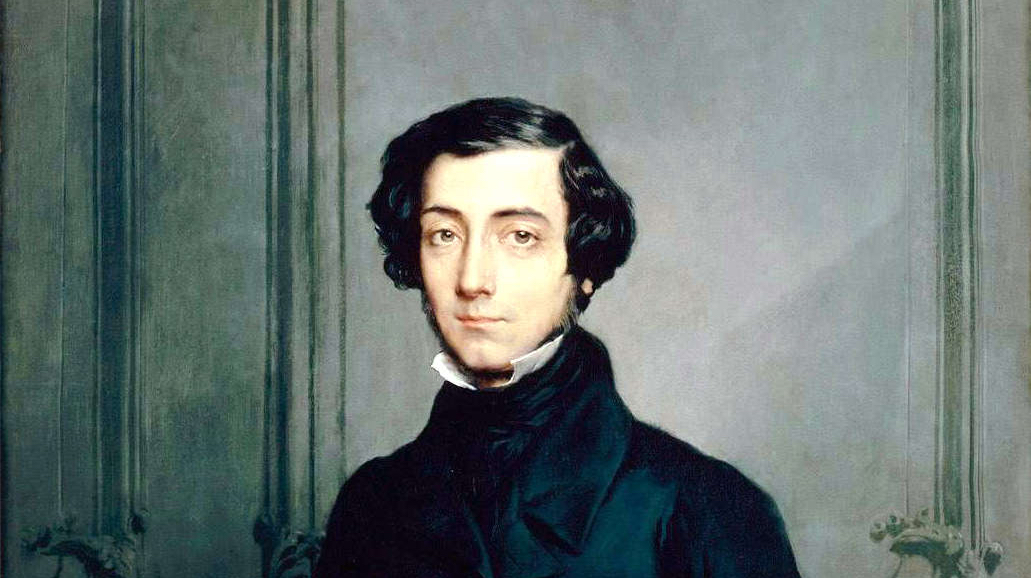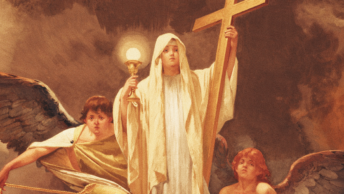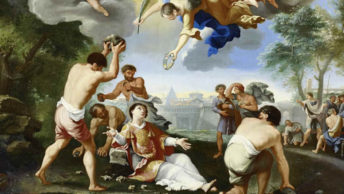Alzheimer’s is a terrible disease that not only degenerates the body but also more tragically, erases a person’s life memories, daily functions and complete personality. Alzheimer’s dire affects are magnified exponentially when an entire nation loses its historical memory. This is what has been happening to the American people the past 40 years. The truth of its memory has been systematically erased from the pages of its history just as the Soviet Union did right up until its collapse in 1991.
All American History teachers should use only the ruler of truth to measure the merits of the American past against a backdrop of reason, research and profound thinking. American history should relate both America’s triumphs as well as its failures. To deny students their true history is to alienate them from their community, nation, and culture. Teachers should however confine their teaching to historical information, and not indoctrination or propaganda of any kind.
Writing in 1998 for the Watchmen Center, Walter MacDougall underscored the importance of history to America’s citizens. History is the best vehicle for vicarious experience that truly educates provincial young minds and obliges them to reason, wonder, and brood about the vastness, richness, and tragedy of the human condition. If taught well, history trains young minds in the rules of evidence and logic. To listen to liberals debate issues today, underscores their woeful lack of logical reasoning skills.
History also has a valuable moral aspect. It is the only academic subject that inspires humility. Theology used to do that but given its ostracism from the public schools, history must do the work of theology. It is, for all practical purposes, the religion in the modern curriculum. In the post-9/11 era, it is increasingly necessary that students understand America’s relationship to the rest of the world. Without a proper constructive view of their own history, American students are rudderless in a world swept by vicious and unruly tides of destruction. Like precious heirlooms these intellectual treasures have to be preserved by each succeeding generation of students.
In the popular 1978 satire of American college life, Animal House, Sam Cooke’s song Wonderful Life was featured because of its opening lines don’t know much about history… How prophetic are those words for the American educational system of today! While American students may lag behind their foreign peers in math and science, their knowledge of their country’s history is dolefully immeasurable.
Today’s students have large and disturbing gaps in their knowledge of history. They inhabit a frenetic culture whose myriad of mind-numbing distractions from Rap Music to X-Box video games and a plethora of TV sports make the study of history pale by comparison. All of these pale in comparison to the plethora of social media that encourage people to think in slogans, clichés and word bites. They wander aimlessly like a generation of Amnesia victims who are historically ignorant and destined to lose control of their own cultural institutions.
This situation can only worsen because in most states middle school students are not required to take classes in history or even civics. Many national history and civics assessments show that most fourth-graders can’t identify the opening passage of the Declaration of Independence, and that most high school seniors cannot explain the checks-and-balances theory behind the three branches of our federal government. Nearly 20% of high school seniors think that Germany was an ally of the United States in World War II while 28% of eighth graders do not know why the Civil War was fought.
Seniors at some of the nation’s leading universities cannot correctly identify the Gettysburg Address, or know that James Madison is the Father of the Constitution. To worsen matters, the federal government has instituted President’s Day in celebrating all presidents collectively. This risible idea affords the same recognition for Millard Fillmore and Jimmy Carter as it does for Abraham Lincoln and George Washington.
America’s historical Amnesia did not happen in a vacuum. A 1001 conspiracies effectively derailed millions of American history teachers from properly teaching history and undermining America’s faith in its past and its hope for the future. In this case, all roads lead, not to Rome, but to Frankfurt, Germany just prior to the advent of Adolph Hitler.
After the guns of August became silent in 1918, European socialists realized that the world’s proletariat had not heeded Marx’s call to rise up in opposition to capitalism and embrace communism. It was Sardinian communist, Antonio Gramsci, who argued that Marxists economic tenets had seriously failed and that the only way to topple the West was through a dedicated and calculated long march through its culture that would destroy its religious, social and educational roots.
The Frankfurt Institute for Social Research became the fulcrum for enacting Gramsci’s near-prophetic teachings. The Frankfurt School’s primary goal was to translate Marxism into cultural terms. With the advent of Nazi terror, many of its Jewish social engineers fled Germany for American academia. It did not take long for scholars like Herbert Marcuse at Brandeis University and Theodor Adorno at the University of California to inflict their intellectual poison on a generation of college students.
Using its weapons of political correctness and multi-culturalism, the cultural Marxists manufactured a new and vibrant amalgamation of Marxism that over the generations would chip away the edifice of America’s traditional culture. Over the years their ideas have infiltrated western churches, businesses and schools, damaging traditions and religious beliefs in their wake. Marcuse recognized that a proletariat of victimhood could emerge from a coalition of students, blacks, feminists and homosexuals, who would be protected from criticism as American culture drowned in a sea of diversity.
Theodor Adorno developed his idea of the Authoritarian Personality in his 1950 book, premised on the idea that Christianity, capitalism, and the American family rested on authority figures, prone to racism and fascism. He believed that anyone who harbored America’s traditional moral values and institutions was both a racist and fascist. His systematic attacks on authority figures found a willing audience among enlightened teachers who vowed to foster the principles of the French Revolution in their students.
The Frankfurt School adepts also developed critical theory, in which they subjected every traditional institution to the most grueling verbal scrutiny. With regard to education, critical theory later became the basis for the Cultural Studies departments that now undermine American colleges and universities. As a result an entire generation of university-educated elite absorbed the poisonous tenets of cultural Marxism.
In a 1966 conference held at Johns Hopkins University, Algerian-born French philosopher Jacques Derrida introduced the word deconstruction–– a term coined by Nazi ideologues– into the American intellectual bloodstream. Deconstruction is the literary theory that holds that there is no single meaning to any text. According to Derrida and his acolytes, reason was a tool of oppression. A derivative of critical theory, deconstruction quickly became the favored means of historical confusion and misunderstanding.
Deconstruction is based on Derrida’s denial of absolute truth and metaphysical certainty, which are the foundation of Western thought since the 15th century. Its fervor caught fire in the minds of teachers and students alike, hoping to be liberated from the dead weight of their antiquated learning. Deconstruction is anti-history. It denies while history explains. Its proponents argue that all texts are empty of true of meaning. Therefore, the only important thing is the meaning the reader gives the text.
Deconstruction denies God while stripping history of its providential meaning. The result is an elite class of scientists and intellectuals who espouse the empty learning of nihilism. It focuses on the linguistic and institutional systems that frame a text, not the ideas themselves. This has facilitated historians who want to distort an American history of triumphalism and geopolitical hegemony. This all leads to what Pope Benedict XVI called a dictatorship of relativism, with readers determining their own truth.
In his 1971 book, Rules for Radical, the textbook for community organizers, Saul Alinsky states that the denial of history is an important component of the denial of ethics and morality. By deconstructing American history, students would become confused and leaving them much more open to his godless radicalism.
The main target of deconstruction has been the idea of American exceptionalism. Alexis de Tocqueville coined the term in his 1831 book Democracy in America. While some historians debunk this concept as mythological, few can seriously dispute the idea that the United States and the American people hold a special place in the history of the world nor can they fault America for its generous ability to pass along its legacy of freedom and democracy to the billions in the world who have never tasted freedom. American exceptionalism is grounded in the fact that America was founded upon an idea of liberty, and as a nation of laws, not on the ambitions of men. It was the first nation founded on the rights of man as inherent and God-given. America’s leaders held that the powers of government derived from the consent of the people and not the jackboot of force. The origin of American exceptionalism was best recorded in the words of Reverend John Winthrop of Massachusetts Bay, who told his Puritan congregation we must consider that we shall be as a city upon a hill with the world watching what they do.
A train of foreigner visitors, such as Crevecoeur’s Letters from an American Farmer, De Tocqueville’s Great Democracy in America, and Lord James Bryce’s American Commonwealth, celebrated these views. Tocqueville lyrically described America as a land of wonders, in which everything is in constant motion and every change seems an improvement.
Some historians point to former State Department employee Francis Fukuyama’s 1992 book, The End of History and the Last Man to underscore the irrelevancy of history. His book stated that the spread of liberal political and economic ideas throughout the communist world and much of the Third World proved that mankind had reached the end of its ideological evolutionary process and there was no need to consider the conflicts that dominated 6000 years of recorded history. His ideas have only fueled the flame of historical deconstruction and added confusion and to a gravely wounded study.
Many historians have taken umbrage at the idea of American exceptionalism. Richard Hughes and Godfrey Hodgson have relegated this antiquated idea to the status of myths that Americans life by. Many historians now teach American history from the flip side of this debate, subjecting it to Marxist critical theory. These professors stress a negative exceptionalism where the U.S. has been exceptionally murderous, racist, and anti-feminist and is the bane of human history.
Acting on the example of Herbert Marcuse, Marxist teachers have so infected the study of American history with their multi-cultural array of gay, lesbians, African-American and gender studies programs under the masquerade of history that they have distorted an accurate portrayal of America’s true history to the detriment to its students, voters and policy makers.
To make matters worse, President Barack Obama’s first year in office proved that he was more a purveyor of American mediocrity than of American exceptionalism. As a cultural Marxist he subscribes to the idea of multi-culturalism, which holds that all cultures are basically equal. During his trips to Greece and England, he went to great lengths to praise Greek and English exceptionalism, leveling his own country without cause. In Obama’s kaleidoscopic left-wing view, no nation is better than any other. Yet his constant apologies for past American injustices and ill-conceived foreign meddling belie that sense of equality and actually lower America beneath the rest of the world.
The constant bashing of United States history, such as that given by its own president, is reflective of the new idea of American Declinism, which refers to those who sense the end of America as a leading power is near. Many of these left-wing professors have been abetted by apocalyptic doomsayers of the right, such as Fox News’ Glenn Beck and author Patrick Buchanan. Lamenting the decline of the US from its lofty heights of power and hegemony, they have unwittingly created a bandwagon of distress
The tide of American history, tainted by man’s fallen nature, will always provide the American people with discomfort, fear and even national crisis. The country suffered a serious blow when Sputnik rocketed into orbit in 1957. History’s natural ebb and flow has sent the American people the Cuban Missile Crisis in 1962, disappointment and virtual defeat in Vietnam, the Jimmy Carter Malaise, and finally the Obama socialist legacy. A photo circulating the Internet shows a graveyard with AMERICA: 1776-2016, chiseled deep into a tombstone.
While the long-term activities of the cultural Marxists have done grave damage to American institutions, as Mark Twain once said, the report of my demise was premature. America has survived revolutions, a bloody civil war, foreign wars, Pearl Harbor, 9/11, panic, depressions, political assassinations, and long periods of social and political unrest. Given the breadth and depth of history, it would be foolish to think that U.S. power might not some day naturally recede like a setting sun.
But not just yet! Alan Dowd, a senior fellow at the Sagamore Institute for Policy Research wrote that people have been predicting the decline and fall of America for 200 years. To be sure, the U.S. faces challenges, competitors and threats that could erode its global position: China and India are ascending economically. The world abounds with asymmetrical threats that have the capacity to undermine the liberal order that Washington has sought to spread for generations. Americans find themselves virtually leaderless in the midst of another great ideological conflict with radical Islam.
American institutions, such as its churches and its families, have proven to be resilient over the centuries. They have a Phoenix-like quality that seems to revive them even when the hour is darkest. It will take a lot more than a posse of amateur Obama liberals to tear down this once proud nation. Will the 21st century also be an American century? Or will the United States be eclipsed by new superpowers like China or the European Union? Only history will reveal the answers. Americans must learn it before the country becomes history!








